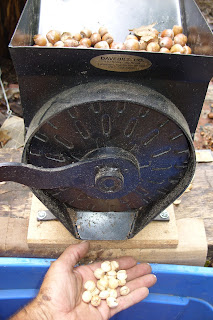I don't think free food gets much easier than this. We harvested over 100 pounds of acorns under just one tree in about a hour and a half of picking. The picture actually does not show a spot where they were real thick.We picked again today, about 300 pounds today. Of course that is the weight green,in the shell, and includes a lot of nuts that will turn out to be worm eaten or immature. We shelled some of these already, a five gallon pail full of cracked acorns yielded about one and a half gallons of good nutmeats.
Here is a picture of our DAVEBILT Nut Cracker. It works great on acorns, I was able to crack that five gallon pail in about 20 minutes including adjusting it a few times.The adjustment for nut size is very simple. A pin is removed allowing the shaft to slide out.Then washers are moved from one side of the cracking plate to the other moving the plate in or out.A very well made piece of equipment well worth its price and a huge time saver if you crack any amount of nuts. Now if he would just come up with a device to crack black walnuts that fast I'd be all set! Cracking is only part of the job of course, the nuts still have to be separated from the shells.I am holding some whole acorn meats below the cracker but they don't come out that way, they are mixed in with the pieces of shell. These are red oak acorns and the only way we have found to separate them out is to do it by hand.
After the acorns are shelled they can be dried like that and stored if you want. We decided to process these all the way as we are almost out of acorn flour from last year. All acorns have to be leached to remove the tannins that make them very, very, bitter before you can eat them. Fortunately, the tannins are water soluble so it is not difficult to remove them but it is somewhat time consuming. The process of removing the tannins is called leaching and consist of nothing more that soaking them in numerous changes of water until they are no longer bitter.
This can be done with hot or cold water depending on how quick you want to get the job done.Cold leaching takes longer but does not remove any of the fat in the nuts. We grind ours through a old meat chopper we keep for that job.The ground nuts are then soaked, drained, and soaked again. I start tasting for bitterness after the third water change. Acorns vary a lot in how bitter they are. Most white oak are not as bitter as most red oak but there are always exceptions.We prefer Burr Oak but this year they don't have many acorns in our immediate area. I'll try to get Ann to post a few acorn recipes once we get caught up, don't ask when that will be.




No comments:
Post a Comment